#bnha manga 255
Explore tagged Tumblr posts
Text
BNHA Manga Chapter 255 Theories
In the beginning , we can see that they detected “ unusual brainwaves “ . This means that even though his past memories were heavily suppressed , the words which meant so much to him brought so much emotion that he was able to snap out of the restrains in his mind , only for a moment . His will and determination to not be overtaken by the other quirk again helped him in gaining control of his mind . I’m just visualizing the real shirakumo to be chained up inside his mind or in a prison like structure and he is able to see everything that kurogiri is doing . If we are going to keep this example in mind , it can also be compared to how the past holders of one for all are inside of Midoriya and are able to see what he is doing . Though both the quirks are drastically different , this was a small comparison I had in my mind.
Further on , we can see that Aizawa and Present Mic are calling his real name and reminding him of his past . We can see how the balance keeps on shifting . The line “ I am Kurogiri , the one who protects Shigaraki Tomura “ is a line that has been forced onto him . He was forced to think like that and thus they had exploited his nature and behavior into protecting Shigaraki . They forced him to believe that who he was before was nothing and this was his sole purpose . He had no one else , he couldn��t be himself , live for himself , other than the intended purpose .
Even when he attacked UA , his alumina , I’m willing to bet that All for One must have done something to reinforce that his purpose was to protect Shigaraki and nothing else . He wasn’t allowed to fell remorse or pain for his actions , but I ‘m certain in the back of his mind he felt horrible for his actions since it was unlike him . These words and the confusion Kurogiri had allowed Oboro to overtake half of the quirks effects with much difficulty . He tried saying Shota’s name .
With both of his friend’s encouraging him , he knew he couldn’t hold this form any longer , but before he went under the effects of the quirk again , he said the word hospital .
This clue he gave is very vital in terms of what it means . There are multiple directions on how this clue could lead further in the story ,
We know that Ujiko holds multiple private clinics and adoption centers . As the police starts researching by going through Shirakumo Oboro’s records and where he was admitted . They would eventually find Dr Ujiko’s interference . The police would then start searching on where all his previous influences were . He might be using different names all the time , but his appearance remains the same .
They had researched and they know ( mostly from hawks ) about who and what the doctor was through the other league members and he would have passed on the message through his secret codes . Hawks has gained the trust of the league members in particular , as they know more about the doctor .
Also , while researching they would find that the information about Tsubasa’s parents are unknown and that he worked in a clinic in the same area where Midoriya and Bakugou lived .
Since the case concerns about Aizawa’s and Present Mic’s old friend , they would help the police with further investigations or All Might would be there and recognize that it was the same place where Midoriya and Bakugou live . Through this , they realize that it is possible for them both to know the child and ask them more information regarding him .
This would mostly lead to a mental breakdown for them as they were really close to him and the fact that a person they used to know did all these horrible things would be heartbreaking . Also , maybe when Izuku visited the doctor and he was declared quirkless , during that time he might have heard about some information . He would have been too shocked at that point to actual think more about it , but this information could be vital to the case .
More detailed information about why all this is necessary is in my chapter 240 theories .
The line said by All for One is very interesting . I feel like there is something he is cluing through this .
“ You people still fail to understand . It’s like making wine . Trampling the grapes to extract their juices . I merely wanted to keep enjoying these delightful flavors . “
There are many ways with which he could be referring to . One , it could mean that he chooses his pawns in such a way that they are somehow connected to the heroes emotionally . So , he refers to this as “ trampling the grapes “ as in trampling the emotions of the heroes for his own delight . In my chapter 239 theory , I have explained in detail about how he manipulates emotions . I have also explained about how Nana’s husband’s death was not a mere coincidence but a plotted plan in my chapter 235 theory .
Another way , it could mean is that in the process of making a nomu , each person is chosen like how grapes are plucked for the vine and they are tactically killed or modified accordingly . “ Trampling of grapes “ could also refer to how different quirks and bodies are being merged , like how many grapes are squashed to make wine and that disgusting sickly delight All for One gets is like drinking wine to him .
Another thing I wanted to talk about was even though Aizawa was using his quirk , how shirakumo was able to come out of the quirks effect or how he still has the mist form . Mutant-Class Quirks are immune to erasure and since Kurogiri’s quirk was a forced mutation . Aizawa was only be able to erase some parts of the quirk than others .
#bnha manga chapter 255#bnha manga 255#bnha manga#bnha theory#bnha#boku no hero academia#kurogiri#shirakumo oboro#aizawa shouta#present mic#hizashi yamada#eraserhead#all for one#shigaraki tomura#daruma ujiko#dr ujiko#katsuki bakugou#midoriya izuku
46 notes
·
View notes
Photo
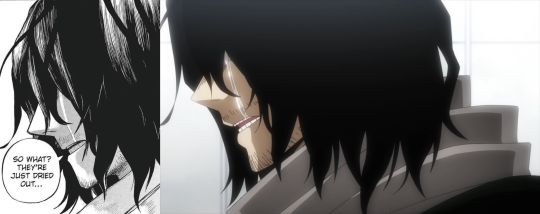


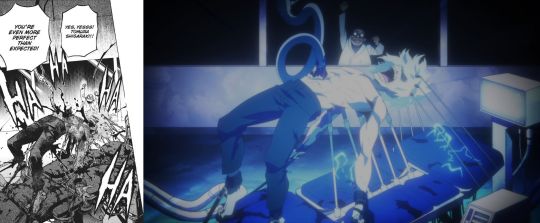
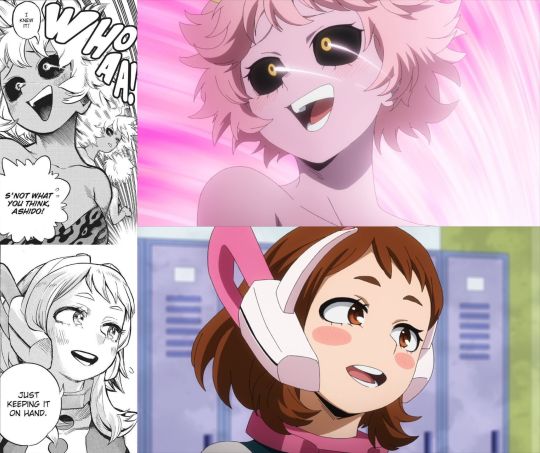

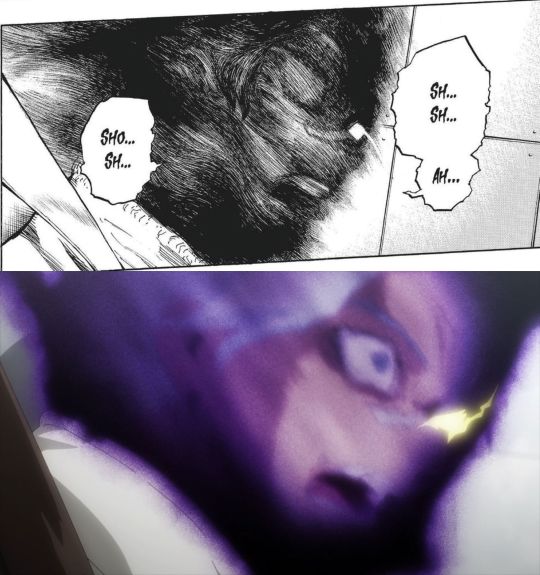



Boku no hero academia 5th season - Episode 19
Manga vs Anime
#bnha#mha#boku no hero academia#my hero academia#boku no hero academia 5th season#bnha anime#bnha manga#bnha 253#bnha 254#bnha 255#comparison#class 1a#ashido mina#uraraka ochako#present mic#aizawa shouta#eraserhead#shirakumo oboro#kurogiri#midoriya izuku#deku#shigaraki tomura#my little angel always so cute#this episode hurt so much#just pain#poor shirakumo 😢#you deserved better#aizawa and mic too#i'm suffering with you#my edit
2K notes
·
View notes
Text
BNHA 253-255 Kurogiri-Aizawa Japanese to English Translation Pt.I
In light of the latest chapter of BNHA, I thought I’d review and translate the Shirakumo chapters of the manga to give us all a refresher on who Shirakumo is, and I don’t just mean in relation to Aizawa and Yamada; I mean as a human. What kind of person is he? What kind of Hero is he?
NOTE: This post is LONG, so I had to break it into two parts. Part I covers No.253-254. Part II covers No.255.
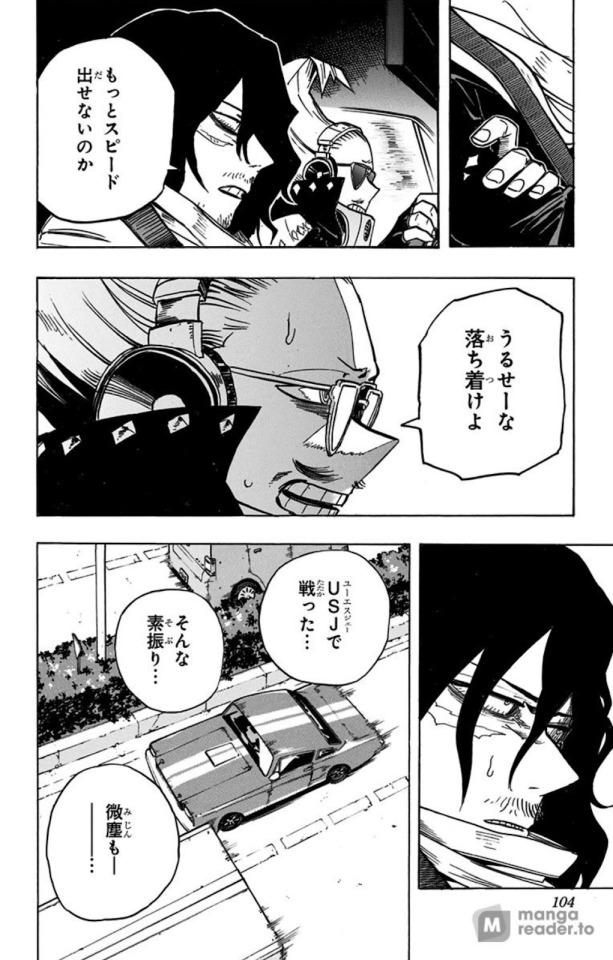
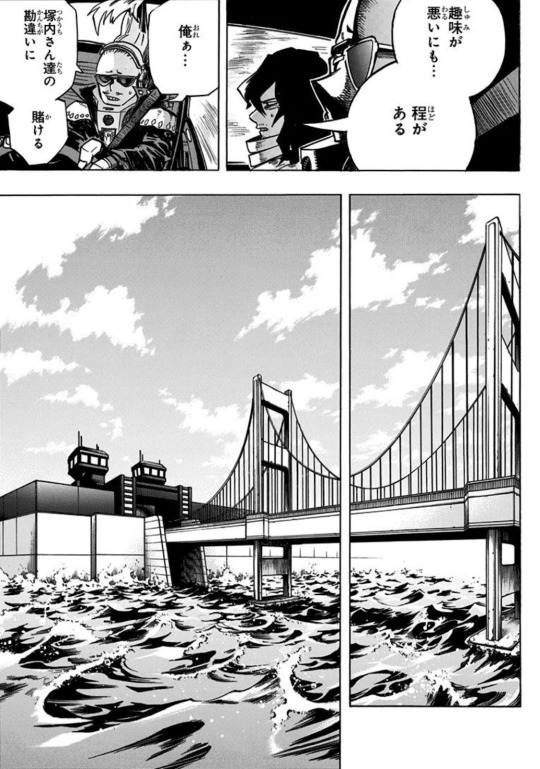
もっとスピード出せないのか
= “Can’t you speed up some more?”
うるせーな落ち着けよ
= “Shut up and calm down.”
USJで戦った... そんな素振り... 微塵も———...
= “When we fought at USJ... the way he acted... I didn’t have the slightest suspicion...”
趣味が悪いにも... 程がある
= “There is a limit... even for poor taste.”
Contextually, Aizawa is saying, "Their evil knows no bounds.”
俺あ... 塚内さん達の勘違いに賭ける
= “I... bet Tsukauchi-san and the others misunderstood / have the wrong impression.”
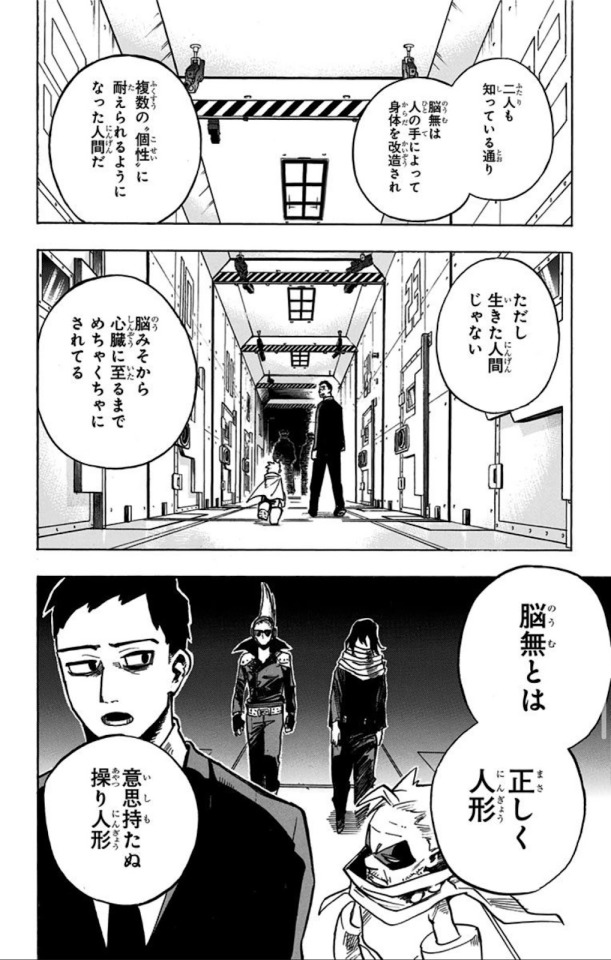
二人も知っている通り
= “As you both know,”
脳無は人の手によって身体を改造され複数の“個性”に耐えられるようになった人間だ
= “Noumu are corpses that have been altered / modified / reconstructed by human hands to become capable of supporting / tolerating multiple Quirks.”
The literal translation for Noumu (脳無) is “no brain / brainless.”
ただし生きた人間じゃない
= “But they are not living people.”
脳みそから心臓に至るまでめちゃくちゃにされてる
= “Everything from their hearts to their brains has been scrambled.”
脳無とは���しく人形意思持たぬ操り人形
= “Noumu are just dolls / puppets, marionettes on strings without wills of their own.”
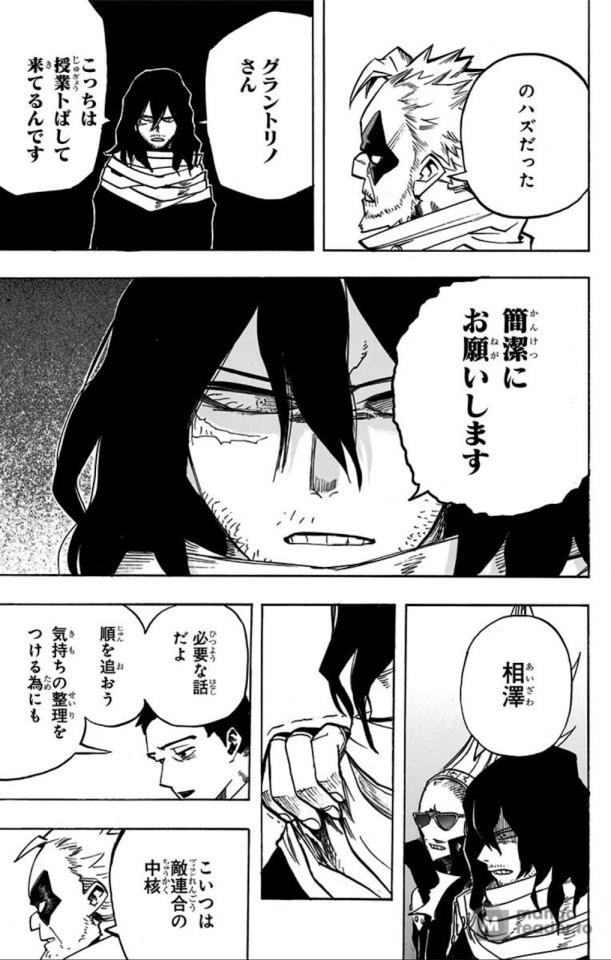
のハズだった
= “They were supposed to be [anyway].”
グラントリノさんこっちは授業卜ばして来てるんです
= “Gran Torino-san, I am missing class to be here.”
簡潔にお願いします
= “Please be brief.”
相澤
= “Aizawa.”
必要な話だよ順を追おう気持ちの整理をつける為にも
= “It is necessary that we talk through this step by step so that you are prepared as well.”
こいつは敵連合の中核
= “This guy / thing is central to the League of Villains.”
Gran Torino uses こいつ (romaji: koitsu) for Kurogiri. It can mean “he; she; this guy, this person; this; this thing.” It is impolite and can be vulgar (= highly offensive) when used to refer to someone with whom one does not share a close relationship, as is the case here. For context, as an interjection, こいつ translates into English as something like “hey, you!” or “you bastard!” or “damn you!” Gran Torino is disrespecting Kurogiri, and he is doing so even knowing that Kurogiri was created using a deceased Hero student as his base, or maybe because of it?
This is my first time translating Gran Torino, but I suspect he always speaks “gruff” like this. “Tough guy” talk and toxic masculinity—y’all know how it is. Fictional characters are significantly more likely to use coarse language than actual Japanese people are. It is more noteworthy when a character deviates from their standard pattern of conduct than when they act in accordance with it. Given Japanese culture’s emphasis on good social etiquette, whether and when a character chooses to use respectful or disrespectful language can tell us something about their personality (and motives in certain contexts), worldview, and how they think about themselves in relation to others, particularly when there are discrepancies between how they speak to and about some people compared to other people.
Take Hawks, for example. His language toward Heroes like Endeavor and Best Jeanist and even toward his abusive, emotionally unavailable parents is polite and humble. He has high regard for Heroes and at least in his speech shows basic respect for his parents, despite their flagrant mistreatment of him during his childhood. (Being polite to someone ≠ actually respecting them; for example, you would probably choose your words carefully if you had a literal or metaphoric gun to your head, but that wouldn’t mean you respect the person staring down the other side of the barrel; how many people think their employer is dumber than a sack of shit but talk to them as if they think they have a brain between their temples because letting slip how they really feel would cost them the job and their livelihood?). His language toward criminals, however, like Dabi and Ujiko, is abrasive. His poor opinion of and low regard for them, even as fellow humans, is evident in how he speaks to and about them, as if they are subhuman and inferior to himself, undeserving of basic respect and compassion.
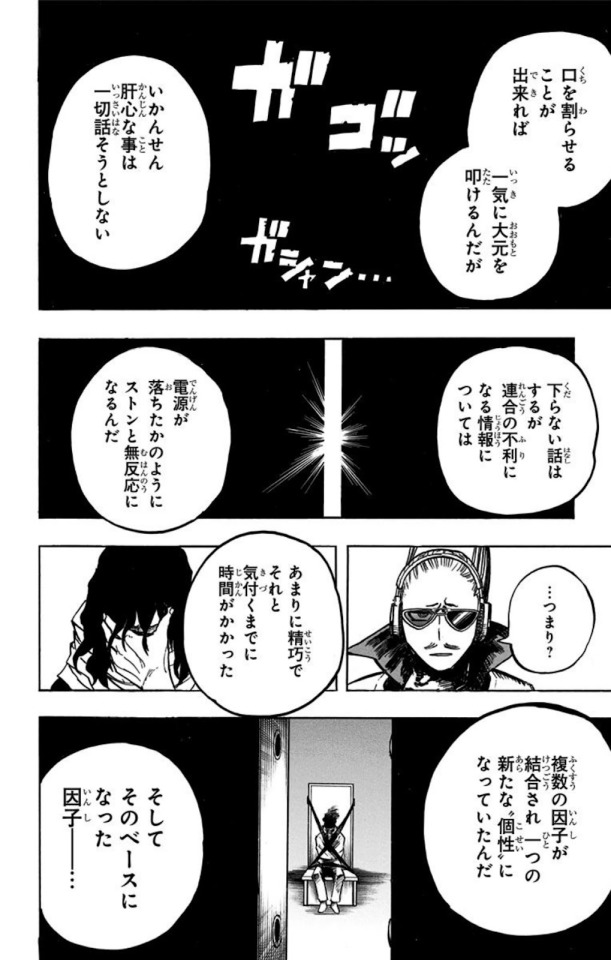
口を割らせることが出来れば一気に大元を叩けるんだが
= “If we could make him talk, then we could immediately strike the head.”
Gran Torino believes Kurogiri possesses crucial intelligence that could be the deciding factor for the imminent war and it is essential Aizawa and Present Mic do their part to assist in the acquisition of that intel.
いかんせん肝心な事は 一切話そうとしない
= “Unfortunately, he will absolutely not talk about anything important.”
下らない話はするが連合の不利になる情報については
= “He will discuss trivial matters, but [he] will not divulge information that could be disadvantageous to the League of Villains.”
電源が落ちたかのようにストンと無反応になるんだ
= “[That’s when] he becomes unresponsive, as if his plug’s been pulled and he’s powered down.”
... つまり?
= “... Meaning?”
あまりに精巧でそれと気付くまでに時間がかかった
= “He’s so sophisticated, it took us a while to realize it...”
複数の因子が結合され一つの新たな“個性”になっていたんだ あら こせい
= “[But] his Quirk is a novel one created by the fusion of multiple Quirk factors.”
Hypothetically, this should mean that a vestige for each person whose Quirk was combined with Shirakumo's to create Kurogiri's Warp Gate exists somewhere deep inside him. The Quirk reflects the person as much as the person reflects the Quirk. Every Quirk carries the energetic "signature" of its host's personality. Maybe that's why Kurogiri doesn't read as a perfect 1:1 for Shirakumo?
そしてそのベースになった因子———...
= “And the base [Quirk] factor was...”

かつて雄英高校で君たちと苦楽を共にし
= “... [one that belonged to someone who] once shared joys and sorrows with you all at UA High School...”
ショータ
= “Shouta!”
若くしてその命を落としたとされている男
= “... a man who lost his life at a young age.”
���雲朧のものと極めて近い事がわかった
= “[This guy’s base Quirk factor] is a close match for Oboro Shirakumo’s.”

No.254 誰よりもおまえはヒーローに
= No.254 More Than Anyone [Else], You Are a Hero

俺たち3人なら何でも解決できると思うんだ!
= “I believe the three of us could solve [any problem]!”
白雲朧は俺と同じインターン先で亡くなった
= Oboro Shirakumo died during our internship.
3人で事務所を建てよう
= “Let’s build an office / agency for three people!”
そう言ってくれた矢先の出来事だった
= The moment he said that is when the incident happened.
さっきも言ったけどショータ細かいとこまで見てくれるし!
= “Like I said earlier, Shouta notices / is attentive to / [has a good eye for] even the most minute details!”
金で揉めんのは ナシな!
= “[Sure], but only [if we agree] not to fight over money!”
倒壊する建物に巻き込まれ——... あっけない死
= [He was] crushed by a collapsing building——... [and] died quickly / suddenly.
嘗て俺たちは
= Before that...
共にヒーローを目指してた
= ... we were aiming to be Heroes together.
つまり
= “In other words...”
After that short flashback and summary of unfortunate events, Gran Torino resumes speaking with this line. His other comments have been laying the groundwork for the conclusion he has reached and is about to share with Aizawa and Present Mic.
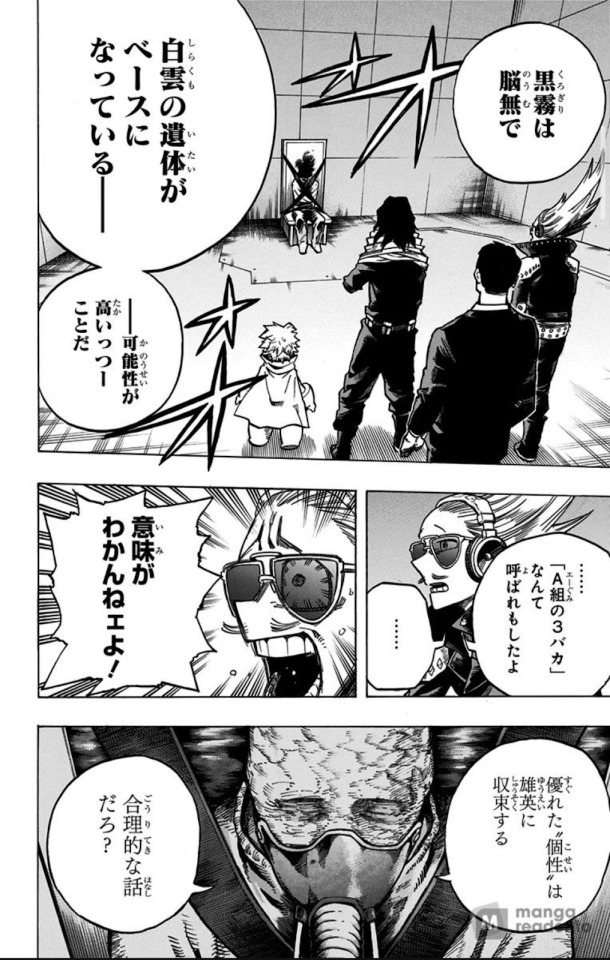
黒霧は脳無で
= “Kurogiri is a Noumu,”
白雲の遺体が ベースになっている———可能性が高いっつーことだ
= “[and] Shirakumo’s corpse became the base for this thing——or at least it’s highly likely.”
......「A組の3バカ」なんて呼ばれもしたよ......
= “...... We were even called the Three Idiots / Fools of Class A......”
馬鹿 (romaji: baka) means “idiot; moron; fool; stupid; etc.” Caleb Cook, Viz’s translator, seems to have tried to be witty by translating the phrase “the Three Idiots / Fools” as “the Three DUMBigos,” as in the Three Amigos, like the Three Musketeers, but the joke falls flat, at least for me. These characters are Japanese, live in Japan, and speak Japanese. They’re being written by a Japanese man living in Japan and creating for a Japanese audience (primarily; BNHA has had international success, but the target audience remains unchanged: Japanese people). It doesn’t make sense for these characters to use Spanish words like “amigos” or “adios.” It sounds out of place and weird because it is. It would be one thing if Horikoshi wrote his characters using borrowed phrases like that, but he didn’t and he doesn’t. Caleb’s attempt at a joke is more eyeroll-inducing than funny.
意味がわかんねェよ!
= “I don’t understand what you mean!”
Notice Yamada’s furrowed brow, the crease that has formed on his forehead, the stark stress lines around the borders of his eyes, his wobbly irises and shrunken pupils, and the beads of sweat on the side of his face. He’s distraught. It’s not that he doesn’t understand. It’s that it’s breaking his heart that he does. He understands, but he can’t accept it. This news has shaken him. He’s struggling to take it all in. He doesn’t want to, but he knows he has no choice because denying reality won’t make it go away.
優れた"個性"は雄英に収束する合理的な話だろ?
= “Outstanding Quirks converge / gather at UA [High School], so it’s [perfectly] logical [to use it as a hunting ground for strong Quirks], don’t you agree?”
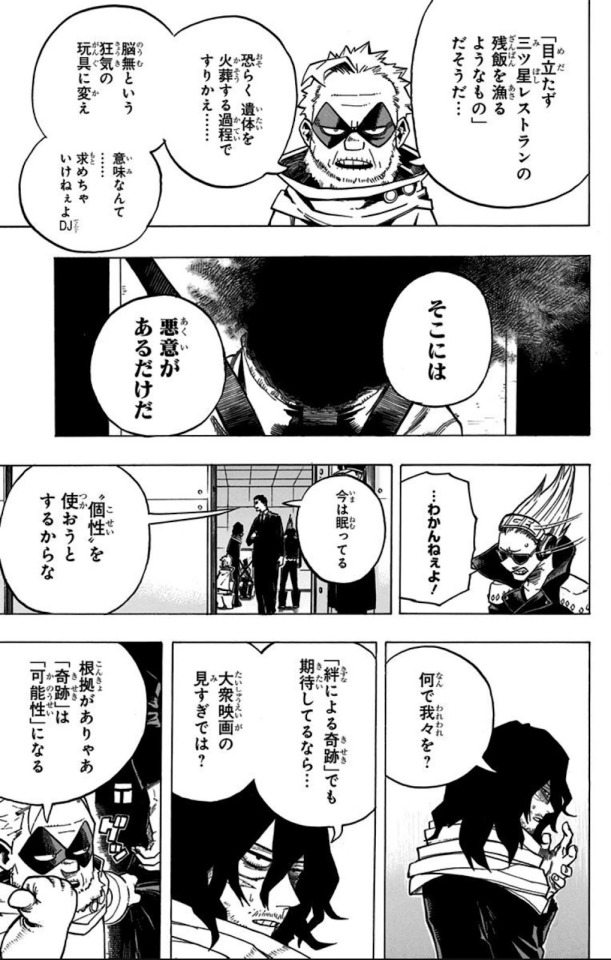
「目立たず三ツ星レストランの 残飯を漁るようなもの」 だそうだ...
= “[He said], ‘It’s like inconspicuously scavenging for leftovers from a three-star restaurant...’”
恐らく遺体を火葬する過程ですりかえ...... 脳無という狂気の玩具に変え
= “I suspect [Shirakumo’s] corpse was secretly swapped for a substitute during the cremation process...... and changed into a crazy plaything called a Noumu.”
意味なんて...... 求めちゃいねぇよDJ
= “Something like meaning / sense [in this situation]...... don’t ask / look for it, DJ.”
そこには悪意があるだけだ
= “There is only malice / malevolence in [him, this / that].”
Japanese pronouns can be dropped when they are implied by context. Because Kurogiri’s face is highlighted as this line is spoken, I am assuming the omitted pronoun would be “him (referring to AFO, with Kurogiri as proof of his evil)” or “this / that.”
... わかんねえよ!
= “... I don’t understand!”
今は眠ってる“個性”を使おうとするからな
= “He’s sleeping now [because] he tried to use his Quirk.”
何で我々を?
= “Why [are] we [here]?”
「絆による奇跡」でも期待してるなら... 大衆映画の見すぎでは?
= “Were you hoping for a ‘miracle through the bonds of friendship’...? You’ve been watching too many popular movies.”
根拠がありゃあ「奇跡」は「可能性」になる
= “If there is a basis, then a ‘miracle’ becomes a ‘possibility.’”
根拠 can mean “foundation,” which I think could also work here. Gran Torino is saying that the close bond between Aizawa, Present Mic, and Shirakumo gives the Heroes as good a chance as any to connect with their former ally (and acquire that all-important information on the League of Villains that they previously mentioned they had been unable to pry out of Kurogiri; strategy, people!).
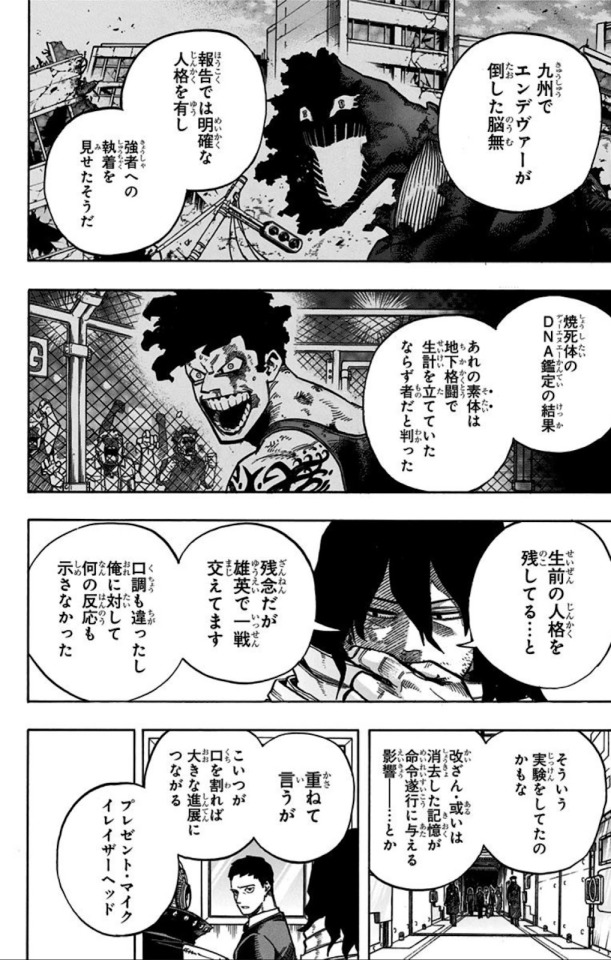
九州で エンデヴァーが倒した脳無報告では明確な人格を有し
= “[According to] the report, the Noumu that Endeavor defeated / killed in Kyuushuu had a distinct personality.”
強��への執着を見せたそうだ
= “It had a fixation with the strong.”
I hate the word “obsessed / obsession” and reeeeallllyyyy hate how often it is used by Caleb and some fan translators to describe the Villains. Horikoshi sometimes uses it or synonyms, but other people use it or similar words more frequently than he does and it’s almost always to make the Villains sound “insane” and hurt their credibility as victims of Hero society testifying to its ills. It’s so much easier to disregard their legitimate grievances with Hero society when we convince ourselves that they’re just a bunch of “uncaring, selfish lunatics” with a “grudge” who are “acting out” and “throwing tantrums” because they “didn’t get their way.” The Heroes peddle that narrative and would love nothing more than for everyone to believe it. Don’t. Those with power and authority do not hesitate to continue abusing their victims and making new ones. Very few people whose privileged position in the world’s social hierarchy affords them rights and luxuries marginalized and oppressed others are wholeheartedly denied would willingly surrender their status and influence for the sake of leveling the playing field to create equity. That being said, 執着 (romaji: shuuchaku) does mean “obsession; fixation; attachment; adhesion; tenacity; clinging (e.g., to old customs).”
焼死体のDNA鑑定の結果あれの素体は地下格闘で生計を立てていたならず者だと判った
= “The results of a DNA analysis of the burnt corpse revealed that [the base for] that thing’s body [came from, belonged to] a thug / hoodlum / miscreant whose livelihood came from underground cage fighting.”
These lines from Gran Torino are loaded with scathing judgment, a core belief that people who make a living by nontraditional means like underground cage fighting are criminal and lesser, or altogether worthless (Mirko???). He addresses the Noumu as “that thing” (あれ, romaji: are, usually used for objects, NOT people; EXTREMELY derogatory and dehumanizing when used for a person as it implies the speaker views them as more of a thing than a person), despite knowing the Noumu are alive (and so able to be killed), have human corpses as their bases, and retain aspects of their original personalities. He is simultaneously acknowledging that the High-End Noumu Endeavor killed in Kyuushuu had a personality the Heroes were able to match to a missing person and objectifying the Noumu AND that person by calling them “that thing.”
I’ll probably offend a few people by saying this, but oh well. In No.81, Dabi affectionately calls a Noumu with eight arms and several chainsaws, a high-powered drill, and a hammer built into its body “Neko-chan (Kitty-chan),” as if it’s cute and endearing, as if he were cooing at a kitten, not a “monster” or “thing.”
In No.350, Dabi expresses disgust with Ujiko and AFO for disrespecting the dead to bioengineer the Noumu.
Why has Dabi, a Villain, shown more respect and compassion for the Noumu than any of the Heroes or police ever have?
生前の人格を残してる... と
= “The personality [of the corpse] while [they were] alive remains...?”
残念だが雄英で一戦交えてます
= “It’s unfortunate, but I fought [him] at UA.”
口調も違ったし俺に対して何の反応も示さなかった
= “His voice and manner of speaking were different [from Shirakumo], and he didn’t have any reaction to me.”
そういう実験をしてたのかもな改ざん. 或いは消去した記憶が 命令遂行に与える影響——... とか
= “That might be due to their experiments... altering / falsifying, or erasing, [his] memories so that [he will] obey orders......... or something like that.”
重ねて言うがこいつが口を割れば大きな進展につながる
= “Like [we, Gran Torino] said, getting this guy / thing to talk could be a great development for us / could give us a huge lead.”
Tsukauchi’s reference to Kurogiri (こいつ, romaji: koitsu, informal, implies contempt) is also condescending. Like are, koitsu can be used for objects, which makes using it and related words for a person a bit problematic. It is impolite but is sometimes used in anime and manga between familiars, especially among male friends.
Here, Tsukauchi is speaking with his colleagues about someone else (Kurogiri). He is not disrespecting his colleagues by speaking like this, but he is disrespecting Kurogiri by using こいつ for him.
Why did the Heroes and police ask Aizawa and Present Mic to meet them? The answer is simple and has now been stated by both Gran Torino and Tsukauchi: They are hoping to exploit their friendship with Shirakumo to use Kurogiri for information that will assist them in taking down the League of Villains. Again, they’re strategizing. They’re assessing the value of the pieces on their side of the board to inform their next moves. This is how war works. Both sides do this. Take AFO, for example. He has determined that Spinner, who had negligible value early in the game, has become a high value piece, while Touya and Himiko, who had great value early in the game, have become less valuable in the final stretch, hence his telling Spinner that it was “all right” to abandon Himiko because all that mattered is that Tomura’s body and Spinner successfully escape and his rather targeted remark to Touya comparing the individuals AFO forsakes and discards to a “cheap lighter that has lost its usefulness / stopped working,” knowing damn well that Touya was cast aside like so by his own family members and that one of the kanji making up his name (燈, romaji: tou) literally refers to a gentle light or flame, like that from a lantern... or lighter. War isn’t pretty, so let’s not (try to) pretty it up.
プレゼント. マイク イレイザーヘッド
= “Present Mic. Eraserhead.”
Notice that Tsukauchi addresses Yamada and Aizawa by their Hero names. He is calling on them to fulfill their duty as Heroes by confronting all that is left of their deceased friend and classmate (and their complex grief over losing him to a sudden, violent death) on the off chance that they will be able to derive worthwhile information from him.

白雲 朧の執着を呼び覚ましてほしい
= “I / we want you to awaken / evoke / recall his [former] attachments.”
呼び覚まして is the te-form of the verb 呼び覚ます (romaji: yobisamasu), meaning “to wake up (someone, by calling out); to awaken; to bring back (e.g., memories); to evoke; to recall.”
Tsukauchi is instructing Aizawa and Yamada to remind Kurogiri of his past life as Oboro Shirakumo and appeal to the emotional bond the three of them had during his lifetime. His hope is that their doing so will jog Shirakumo’s memory, allowing the Heroes to communicate with him.
In the official translation Tsukauchi tells Yamada and Aizawa to “try to awaken any attachments [Shirakumo might still have to his old life],” but he is more direct in Japanese. Horikoshi’s Tsukauchi doesn’t ask Yamada and Aizawa to try to reach through to Shirakumo. He simply says “I want you to do it” and waits for them to deliver on his request.
思い出話でもしろってかァ!?
= “[You’re] even [asking us] to reminisce on childhood memories!?”
Present Mic has every right to be upset. He and Aizawa had their daily routines interrupted just to be devastated by the shocking news that their dead friend’s corpse had been stolen, tampered with, and used as the building blocks for a sadistic science experiment; were informed that their dead friend’s likeness might live on in that sadistic science experiment; were pressured by their superiors to sit across from that sadistic science experiment and have a conversation with him because the possibility that the “power of friendship” might summon their dead friend’s spirit from beyond the grave to feed the Heroes and police intel (at Yamada and Aizawa’s expense) is just too good to pass up; and as if all of that wasn’t enough to make today the Worst Day Ever for Yamada and Aizawa, now they’re being expected to revisit memories made painful by the traumatic loss of a loved one for someone else’s benefit WITH AN AUDIENCE! This isn’t for them or for Shirakumo. This is for Hero society. But for Yamada and Aizawa, it just hurts. It’s cruel.
頼むよ
= “I am / we are imploring you [to do it].”
頼む (romaji: tanomu) is a transitive verb that usually means “to request; to beg; to ask” but can also mean “to entrust.” As a colloquialism, it translates to “please; please do.”
よ (romaji: yo) is a particle that can be used in a variety of ways. At sentence-end, like it is here, it can indicate certainty, emphasis, contempt, a request, warning, etc. Ending a request or suggestion with よ carries the nuance of sounding pushy, even demanding, and could have nagging overtones. It implies a suspicion or awareness that the listener / recipient does not share your perspective and is opposed to doing something you are in favor of doing.
Tsukauchi knows that Yamada and Aizawa are uncomfortable and do not want to be doing this, but he is pressing them to do as he asks anyway. (Please don’t pressure people to do anything they are not comfortable doing. The absence of “no” ≠ “yes.” If it’s not an enthusiastic “yes,” it’s a “no,” period. “No” is a complete sentence, even when it is only implied by weak protests or silence.)
ご遺族 には?
= “This isn’t his bereaved family’s burden / responsibility?”
Present Mic is desperately trying to escape this stressful situation.
Aizawa was doing more of that earlier on when he was snapping at the driver of the car and making a point to inform Tsukauchi and Gran Torino that he had sacrificed instruction time for this. At this point, though, he’s resigned himself to appeasing his superiors, but his hardened expression and defensiveness betray how anxious he really is.
君たちでだめなら——...
= “If you two can’t do it——...”
They’ll flip Shirakumo’s surviving relatives’ lives upside down again with all these horrific revelations. Yes, yes, the fate of Hero society—of “the world”—might depend on this, but can we at least acknowledge how unkind it is to these people—Shirakumo’s friends and family, the people who actually knew and cared about him—to be bothered with this? Retraumatized by it? To have their lives upended and their relationships with him exploited? A world full of individuals matters because individuals matter. People matter. All of them. Every. single. one.
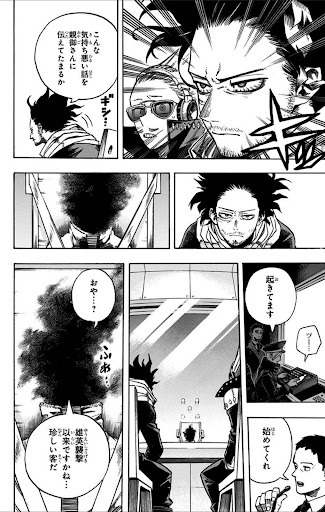
こんな気持ち悪い話を親御さんに伝えてたまるか
= “[Then you will] burden his parents [with] such a disgusting story [about their child]?”
You might have noticed that Aizawa’s sentence did not end in a “?” and so appeared to be declarative rather than interrogative. Why did I frame my translation of it as a question? か is a marker of the unknown and commonly used at sentence-end in place of a question mark. Tsukauchi’s last sentence trailed off partly because he hesitated and partly because Aizawa interrupted his emotional pause by activating Erasure. Intuiting where he was going with it, Aizawa cut him off, having relented to doing as he had been directed for the sake of sparing Shirakumo’s parents any further heartache and discomfort. Aizawa uses sonkeigo (honorific or respectful) language to refer to Shirakumo’s parents (親御さん, romaji: oyago-san), as is customary when speaking of or to someone’s parents, including your own. Still, it’s nice of him to consider their feelings and want to protect them. It also shows maturity that he can (implicitly) acknowledge that although this situation is incredibly difficult for him as Shirakumo’s friend, it would probably be even harder for his parents.
ツー...
= Zzt...
ツ is katakana, isn’t a word, and doesn’t mean anything. It’s a sound. The hiragana equivalent is the smaller っ. At the end of a word it can indicate a glottal stop, an abrupt, dry, constricted noise in your throat, where your glottis is located, that kind of sounds like your voice suddenly giving out, dropping your volume down to a whisper or less. Here, it seems to be an onomatopoeia for the staticky hiss generated by the radio as Kurogiri stirs.
起きてます
= “[He is] waking up.”
始めてくれ
= “Begin.”
おや...?
= “Oh...?”
雄英襲撃以来ですかね... 珍しい客だ
= “[Didn’t we] last meet during the attack on UA...? [What] a curious / unusual visitor [I have].”
Present Mic was right. Kurogiri doesn’t talk like a 17-year-old. He speaks too formally to sound like anything but a posh butler and/or nanny for an exceptionally wealthy family. He’s like Tomura’s own Alfred Pennyworth or Jarvis.

イレイザーが視てもモヤが消えない
= Even with Eraser staring [at him], the haze isn’t dissipating.
身体そのものがもうこういうつくりってこった
= [It’s] like they said, the body itself was intricately bioengineered [to be] like this now.
Notice the on-the-verge-of-tears wrinkle in Yamada’s chin, the dark bags under his eyes, and the exasperated sweat drop running down the side of his face. Poor man’s going through it.
やっぱ間違えてんじゃねえのか!? こいつと白雲に共通点 なんざ——...
= “See!? I knew you were wrong [about him]! This guy and Shirakumo are nothing alike / have nothing in common—...”
死柄木弔は元気ですか? 捕まったりしてませんか?
= “How is Tomura Shigaraki? Is he well / in good health? Has he been captured / arrested?”
知っらねーよ!
= “We don’t know!”
そう... 残念です
= “I see... How disappointing / unfortunate / vexing / regretful.”
I included all of these potential meanings for 残念 (romaji: zannen) because I imagine that all of them are applicable. For Kurogiri, not knowing if Tomura is safe is disappointing and unfortunate (because the Heroes are unable—actually unwilling—to update him), vexing (because it’s frustrating not knowing and not being free to return to his side), and something he deeply regrets (because he was programmed to protect and caretake for Tomura Shigaraki but has not been able to do so for some time).
残念 can also mean “sad; shame; pity,” so both the official (“What a shame”) and fan (“What a pity”) translations’ versions of this line accurately reflect the Japanese. If only that were always the case!
死柄木が気になるのか
= “You’re worried about Shigaraki?”
気になる (romaji: kininaru) means “to weigh on one’s mind; to bother one; to worry about; to be concerned about; to care about; to feel uneasy; to be anxious.” It can also mean “to be interested (in); to be curious (about); to wonder (about).”
The reason I mention these other definitions is to underscore how apprehensive and on edge Kurogiri is being separated from Tomura and not knowing how he is faring. It is also worth noting that Aizawa is able to recognize and empathize with him (because he frets about his students). Kurogiri’s genuine concern for Tomura’s safety and well-being humanizes both of them to a Hero who might (not does, but could) actually care enough to do something about it: Aizawa. This is a rare moment of connection between a Hero and a Villain. Their function on their respective sides is the same. They provide their wards with protection, guidance, and support along their journeys. They care for them. They lose sleep over them. In that way, Kurogiri and Aizawa are like two sides of the same coin: back to back and facing in opposite directions but more alike than they are different (at least in this!).
ええ彼の世話が私の使命
= “Yes. Helping / looking after / attending to him is my mission.”
クソみてーな使命だな
= “Looking after [that damned brat] is a shitty mission!”
あんな陰気くせーガキンチョの 面倒見るのが使命だなん......
= “What a bothersome mission, [being forced] to take care of such a chronically melancholy / gloomy / miserable brat......”
Present Mic uses several words to describe Tomura in this sentence. The first of these words is 陰気 (“gloomy; dismal; miserable; melancholy”), together with くせ (“habit (usually a bad one); tendency; peculiarity; idiosyncrasy; mannerism; quirk”) and ガキンチョ (“brat; kid; urchin; little devil”). He also characterizes caretaking for Tomura as “bothersome; tiresome; a bother to do.”
The implication seems to be that Yamada believes Tomura’s frequent choleric and morose demeanor is the result of poor character or (bad) habit rather than a symptom of complex trauma and severe mental illness, or the cause makes no difference to him because [he imagines] the result (= Tomura’s sullenness) is a pain in the ass to have to deal with either way, which is an insensitive and unkind attitude to have toward people living with mental illness. Present Mic has no way of knowing Tomura’s background, but I don’t think it’s unreasonable to expect a Hero to have more sympathy and compassion for people with obvious mental health struggles—for people in general, really. It costs nothing to be kind. Shouldn’t Heroes be kind?
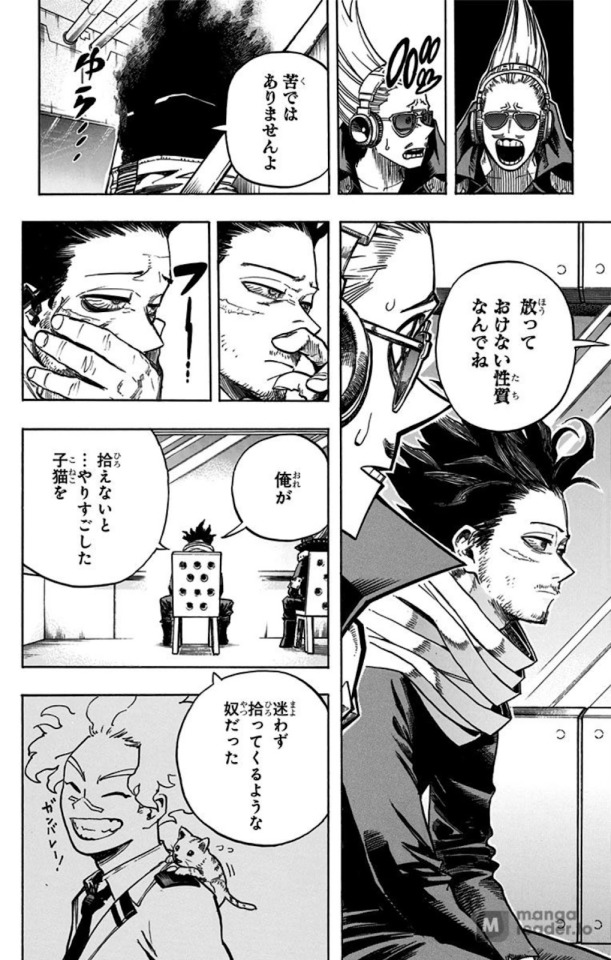
苦ではありませんよ放っておけない性質なんでね
= “It is not painful / bothersome / unpleasant for me [to do it] as it is not in my nature to abandon [others].”
俺が拾えないと... やりすごした子猫を迷わず拾ってくるような奴だった
= “Even when I walked past... the kitten without picking it up, you were the kind of guy who didn’t hesitate to pick it up / take it in.”
The kitten is either climbing Shirakumo’s body to perch on his shoulder or has slipped from it, as indicated by the two motion lines at its back and nervous sweat drops flying off his little head. Shirakumo is saying, “Hang in thereeee!”
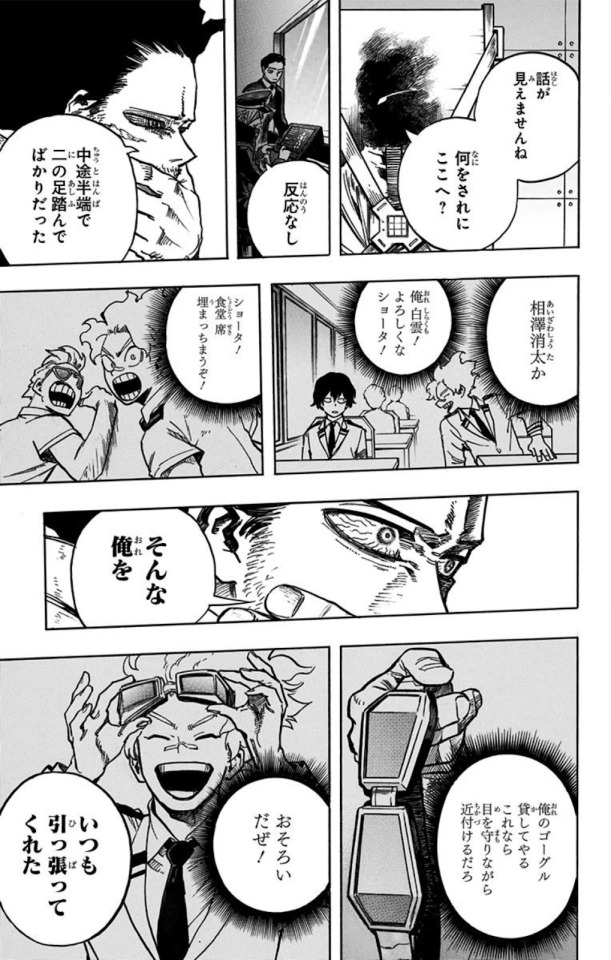
話が見えませんね何をされにここへ?
= “I’m afraid I don’t understand what you’re saying. What are you doing you here?” or “I’m afraid I don’t understand what you’re saying. Why are you here?”
反応なし
= “No reaction.”
中途半端で二の足踏んでばかりだった
= “I was always hesitating and half-hearted / taking half-steps...”
Interesting. Shouto says the same thing about himself in No.352 after Touya accuses him of ungratefully half-assing his way through the life Touya would have given anything to have returned to him, which Shouto unabashedly confirms he is guilty of doing (I say unabashedly because as of No.352, Shouto has accepted who he is, defined his identity on his own terms, reconciled his troubled past with the bright future he envisions for himself, and made peace with both of his parents to the degree he is able to, concluding his arc).
相澤消太か俺白雲! よろしくなショータ!
= ‘Shouta Aizawa, right? I’m Shirakumo! Pleased to meet you, Shouta!’
ショータ! しょくどうせき食堂 席埋まっちまうぞ!
= ‘Shouta! The cafeteria is going to be filled up / all the seats are going to be taken!’
そんな俺を
= “[Even though] I was like that...”
俺のゴーグル貸してやるこれなら目を守りながら近付けるだろ
= ‘I’ll lend you my goggles, so you can approach [Villains] while protecting your eyes!’
おそろいだぜ!
= ‘We match!’
いつも引っ張ってくれた
= “... [you] always pulled me along.”
This is also reminiscent of Shouto’s internal monologue in No.352 about how he always felt he was lagging but his classmates in 1-A “never left anyone behind” and always gave him a place to belong and feel unconditionally supported.
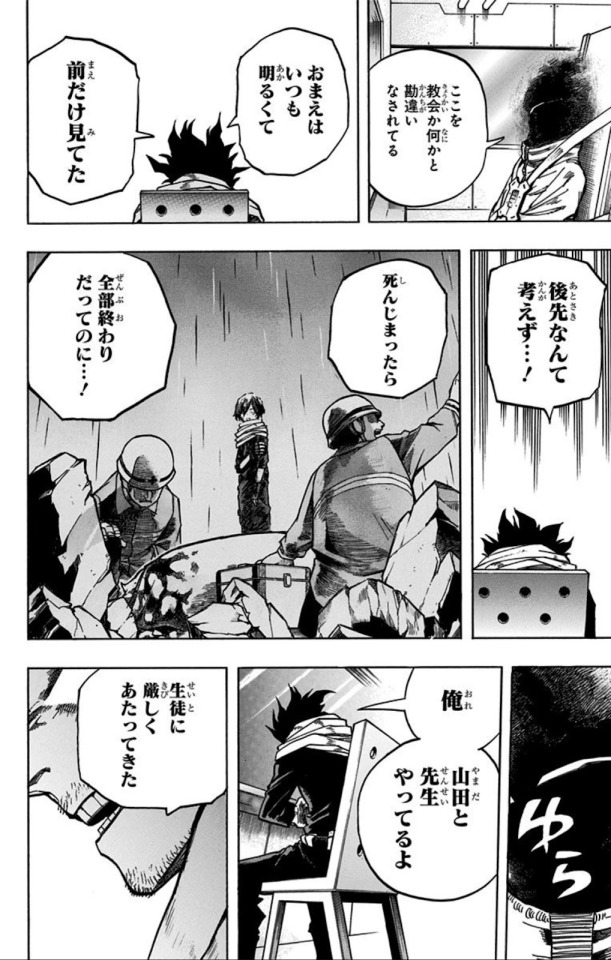
ここを教会か何かと勘違い なされてる
= “Have you mistaken this place for a church confessional or something?”
おまえはいつも明るくて前だけ見てた後先なんて考えず...!
= “You were always cheerful, only looking forward without thinking about the consequences...!”
死んじまったらぜんぶ お 全部終わりだってのに…!
= “Even though death is the absolute end for you / it’s all over when you’re dead...!”
Obviously, Aizawa is thinking about Shirakumo here, but given that he follows this line up by sharing that he has strict rules for his students intended to prevent another tragedy like the one that took Shirakumo’s life, I think it’s fair to assume he means that death is the absolute end for everyone, so everyone should take care not to be careless with their lives.
俺山田と先生やってるよ
= “Yamada and I are teachers now.”
生徒に厳しくあたってきた
= “I’m strict with my students.”

除��回数がえげつないって話だな
= “I hear that the number of [students] he expels is obscene.”
書類上じゃな
= “On paper it is.”
ねぇさっきイレ先凄い形相で出てったの見た?
= “Hey, just now... [did you see] Eraser’s terrifying expression when he walked out?”
いっつも凄い形相じゃん?
= “Doesn’t he always look terrifying?”
いやいつも以上だったよ俺ら除籍した時並み
= “No, it was more disagreeable / unpleasant than usual, like that time he expelled us.”
じゃあ私らん時未満だ
= “So, it wasn’t as bad as then.”
今でもうなされるよ俺「終わったっ」... つって
= “I still have nightmares [about it]... I thought it was ‘over’!”
やけどそのおかげで私ら成長できたっちゃん
= “But thanks to that, we were able to grow.”
いや注意感覚でするもんじゃないからね!? 除籍!
“Oh, come on! There isn’t [a better way] to give someone a sense of caution!? Expulsion!”
おかげで2-A全員経歴傷入りだよ!?
= “Thanks to that, everyone in 2-A has flawed / stained personal histories / resumes / records!?”
イカレイザーヘッド!!
= “E-cRAZ-er Head!!”
I tried my best with that, y’all. Aizawa’s former student is making a pun out of the pronunciation of Eraser (イレイザー, romaji: Ireizā) and “crazy” (クレイジー, romaji: kureijī), which sound similar in Japanese. I tried to mirror the puntastic effect in English by translating the first half of the line, where the pun falls, as “E-cRAZ-er.” Try reading that aloud. E-raz-er. E-craz-er. They sound alike, right?
除籍と復籍の権限?
= “[You are requesting to be granted] the authority to expel and reenroll [your students]?”

はい———... 命の自己犠牲と命を捨てる事は同義じゃない履き違えた若者に
= “Yes———... self-sacrifice and throwing away one’s life are not synonymous. Young people confuse the two.”
望み通り一度"死"を与えます
= “I’ll give them just as they desire—a ‘death’ of sorts.”
その上で更なる向上に努めさせる
= “That will also [encourage them] to work hard to improve even more / reach even greater heights.”
自由な校風が雄英の売りなのさ...
= “Well, the selling point of UA is its flexible learning culture / customs...”
おまえに...... おまえのような誰かを引っ張って いけるヒーローに... 長く生長きてほしいから
= “[I want] for you...... for people like you to become Heroes who can pull others along... and live long lives.”
I haven’t been active in the BNHA fandom for anywhere near as long as I know some of you have. I’d never seen an episode or read a chapter of BNHA until a little over a year ago and I only ventured into the fandom some months ago on Twitter. I’ve been reading meta and translation posts on Tumblr for a bit longer than that, but I’ve never been brave enough to participate in extended discussions and the like, which I hardly think is Tumblr’s strength or purpose anyway. I’ve noticed a tendency among fans to assume that characters mean literally everyone—civilians, Heroes, and criminals/Villains—when they say “everyone” or something along those lines. If you’re familiar with my Twitter posts (hi!), you’ve probably picked up that I’m not in favor of that assumption and err on the side of “everyone” being a substitute for “people like [me]” until we have clear evidence (actions, not words) that a character truly means everyone when they say “everyone,” no exclusions or weightless arbitrary exceptions (that are quickly withdrawn, if they were ever sincere to begin with) for people they decide they like because they remind them of themselves (Hawks) or people they happen to share blood with (Endeavor).
In this case, Aizawa is saying “people like you (Shirakumo),” so to understand who it is he wants to “become Heroes who can pull others along... and live long lives,” we need to consider the lines before and after this one (for context) and ask, “What kind of person is Shirakumo?” We know that he is a person who cannot abandon others and cannot ignore anyone in need of help, human or furry friend. We know that he had a sunny disposition and optimistic outlook that was a source of comfort and inspiration for others. We also know that he was a student of Hero Academia and hoped to become a Pro Hero. So, who is it that Aizawa wants to “become Heroes... and live long lives”? Students of Hero Academia. This is not “I want everyone to be happy and die from old age warm in bed.” It’s “I want people like us to be happy and die from old age warm in bed.” There’s a difference, and it’s an important one because it speaks to Aizawa’s values, motivations, and worldview. We should be asking the same questions of every character.

白雲でもまだおまえがそこにいるのならなろうぜ... ヒーローに! 3人で!
= “Shirakumo, if you’re still in there, you can still be(come)... a Hero! Three people!” or “You can still be(come)... a Hero! The three of us [together]!”
That last sentence is a reference to two lines Shirakumo had spoken just before being killed by a collapsing building (俺たち3人なら何でも解決できると思うんだ! : “I believe the three of us could solve [any problem]!” and 3人で事務所を建てよう : “Let’s build an office / agency for three people!”). 3人 means “three people.”
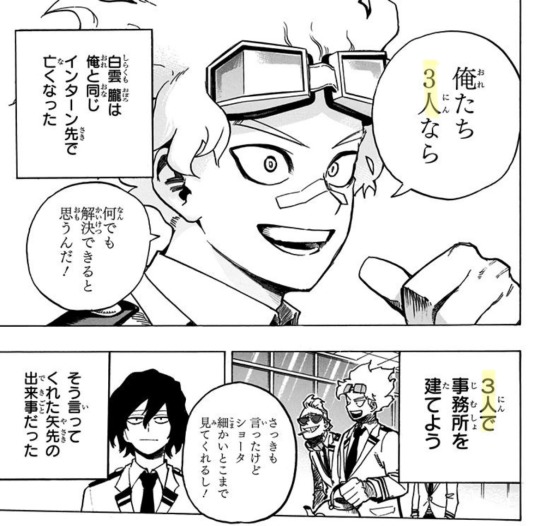
This concludes Part I. Part II can be found here: https://at.tumblr.com/antiquity1111/bnha-253-255-kurogiri-aizawa-japanese-to-english/el63fj8fakj8.
#bnha#mha#bnha manga#mha manga#bnha 253-255#mha 253-255#bnha manga translation#mha manga translation#bnha manga spoilers#mha manga spoilers#bnha 373 spoilers#mha 373 spoilers#bnha aizawa#mha aizawa#bnha shirakumo#mha shirakumo#bnha present mic#mha present mic#oboro shirakumo#kurogiri is shirakumo
28 notes
·
View notes
Text



this chapter had some exceptional aizawas
#this chap was a TRIP tho yall#bnha 255#aizawa shouta#eraserhead#bnha#boku no hero academia#mha#my hero academia#manga edit#fanart#bnha fanart#bnha manga spoilers#manga spoilers
4K notes
·
View notes
Text
Horikoshi: *introduces at least three positive characters, talking about the importance of a smile*
Horikoshi: The people in this world who can smile are always the strongest.
Also Horikoshi, creating AfO:




#mha afo#all for one#bnha#dfo#boku no hero academia#boku no hero academia chapter 255 manga arc#boku no hero academia chapter 255 chapter#all for one bnha#afo#mha#my hero academia
82 notes
·
View notes
Text
Hawks is a sweet but cheeky bugger.
Remember chapter 246 where we got this great panel of Twice asking Hawks to explain what the whole Meta Liberation Army was about despite being neck deep at this point?

Well, Hawks definitely made good on his promise, but his title on the whiteboard is killing me!

"Little late to be asking about this stuff! - Liberation Army Facts"
I love and relate to him more every day.
#hawks bnha#bnha hawks#hawks#hawks mha#mha hawks#manga spoilers#bnha spoilers#chapter 255#twice#haitus#he really is my spirit animal#takami keigo#keigo takami
3K notes
·
View notes
Photo

s h i r a k u r o g i r i
#fyeahbnha#bnha#dailybnha#shirakumo oboro#kurogiri#bnha spoiler#bnha 255#mha#mha spoilers#bnha manga spoilers#my coloring#ez.txt
2K notes
·
View notes
Text
decided to look for the chapters where Oboro is first mentioned in the manga
i’m definitely not looking forward to re-reading the pain all over again and actually experiencing emotions this time
but besides that, i’m not gonna read any of the chapters before or after those other than the ones in the most recent manga arc since i’m kinda glad i forgot most of the MVA arc + Endeavor agency arc
anyways, wish me luck
i’ll update later with a reblog if i cry or not
#my hero academia#boku no hero academia#mha#bnha#mha manga#bnha manga#mha manga spoilers#bnha manga spoilers#mha 253#bnha 253#mha 254#bnha 254#mha 255#bnha 255#shirakumo oboro#oboro shirakumo#loud cloud#random#hush up mandi#i ramble
20 notes
·
View notes
Text




HEROES RISING
from @C_PIG and @aitaikimochi
#bnha spoilers#boku no hero academia#my hero academia#mha#bnha#bnha manga#todoroki shouto#midoriya izuku#izuku midoriya#mha spoilers#heroes rising#bnha 255#mha 255#bakudeku#katsuki bakugo#bakugou katsuki
2K notes
·
View notes
Text

he found a more gullible himbo to manipulate
1K notes
·
View notes
Photo

this was fun but also SAD TO DRAW HOLY HECC
#shirakumo oboro#eraserhead#aizawa shouta#bnha fanart#my hero academia#bnha#bnha art#manga spoilers#bnha manga spoilers#kurogiri#bnha kurogiri#present mic#yamada hizashi#anime#digital art#my art#bnha chapter 255#league of villains#bnha spoilers
998 notes
·
View notes
Photo

No. 255: Aspiring Hero
Prison Guard: There's an abnormality in the shape of his brain waves.
Gran Torino: What does that mean?
Prison Guard: He's feeling agitated/disturbed.
The mist of Kurogiri's face area moves violently. Tsukauchi calls to Aizawa through the mic and asks him to try and figure out the manufacturer of the Nomu and where Shigaraki is.
Aizawa thinks to himself, even if it's true, the thing I see in front of me now just used to be my friend. It's Shirakumo's corpse. There's no way he'll come back.
Aizawa remembers them eating together during their school days. He stands up from his chair and says "Who changed you! Did they mess with your brain? Did you feel nothing when attacking UA?"
Kurogiri replies "Wh... what... are... you... talking about"
Mic watches over Aizawa as he continues. "Answer me Shirakumo!"
Kurogiri replies "I am Kurogiri. He who watches over Shigaraki."
Aizawa yells back "You're U.A. High School Class 2-A, an aspiring hero like I was..."
And both Aizawa and Mic say "Oboro Shirakumo!"
Kurogiri's mist wipes off half his face and you can see the shape of Shirakumo's face and he looks like he's going to say something.
Aizawa pounds on the glass between them yelling "You can do it!" and remembers their days as students. "If the three of us are together, 2 of us can always cover for the other if he makes a mistake!" he remembers.
Kurogiri says "Hospital" and the mist floats up as he faints.
The meeting is over, and Aizawa apologies for not being able to learn any details. Tsukauchi gives them a handshake for their work and they say goodbye. Later he tells the Hero Association about Kurogiri. We then change locations to the PLF mansion.
Twice is explaining the ideals of the PLF to Hawks on a whiteboard. A (probably encrypted) message comes in on their cellphone "The young cloud is causing trouble at the hospital, please help". Hawks just says "I'm busy so I'll pass" and throws his cellphone on the couch. Twice is like "What was that about?" and Hawks pretends to be clueless saying they were asking him for help. Hawks thinks to himself "Hospital, the pieces are coming together!"
Then we see the inside of some hospital.
Shigaraki is covered in cords from head to foot. Ujiko watches him from behind glass, "The most amazing person, the masterpiece that AFO and I always wanted! You're doing well Shigaraki! This is going better than planned!"
#bnha#mha#boku no hero academia#my hero academia#chapter 255#bnha spoilers#mha spoilers#manga spoilers#aizawa shouta#shirakumo oboro#kurogiri#shiragiri#present mic#gran torino#naomasa tsukauchi#hawks#twice#shigaraki tomura
937 notes
·
View notes
Text
imagine reading kny 188 and bnha 255 in the same 10 minutes..:) my eyes hurt

#kny 188#bnha 255#bnha spoilers#kny spoilers#kimetsu no yaiba#boku no hero academia#kny manga#bnha manga#mha manga#mha spoilers#demon slayer#obanai#iguro obanai#iguro#kanroji mitsuri#kny mitsuri#kny muzan#muzan kibutsuji
847 notes
·
View notes
Text
BNHA 253-255 Kurogiri-Aizawa Japanese to English Translation Pt.II
This post covers my Japanese to English translation for No.255 and completes Kurogiri and Aizawa's No.253-255 interaction. Part I can be found here: https://at.tumblr.com/antiquity1111/bnha-253-255-kurogiri-aizawa-japanese-to-english/ia0fr6sgukc5.

誰かがミスっても残りの二人がカバーしてくれるし
= “Even if someone makes a mistake, the other two people will compensate for / offset him.”
カバー (romaji: kabaa) means “cover; to compensate for (a loss); to offset (a weakness); to back up.” I opted NOT to translate it as “cover” to avoid giving the impression that Shirakumo means that they can cover up one another’s blunders and missteps, which sounds unethical and criminal, when he actually means that each of them has strengths that can act as a counterbalance for the others’ weaknesses and blind spots. There are three of them, so if ever one of them has a lapse in judgment, the other two can speak him to reason or otherwise move to correct him. Think Izuku and Shouto with Tenya when he confronted Stain with the intention of murdering him in retaliation for crippling Tensei. Alternatively, imagine Yamada uses Voice intending to incapacitate a Villain, totally overlooking a civilian unwittingly crossing into the line of falling debris from the surrounding infrastructure (like Shirakumo did). Luckily, Aizawa and Shirakumo are present, notice Yamada’s oversight, and rush to the aid of the civilian, saving their life. That’s what Shirakumo had in mind.
病... 院
= “Hos... pital.”
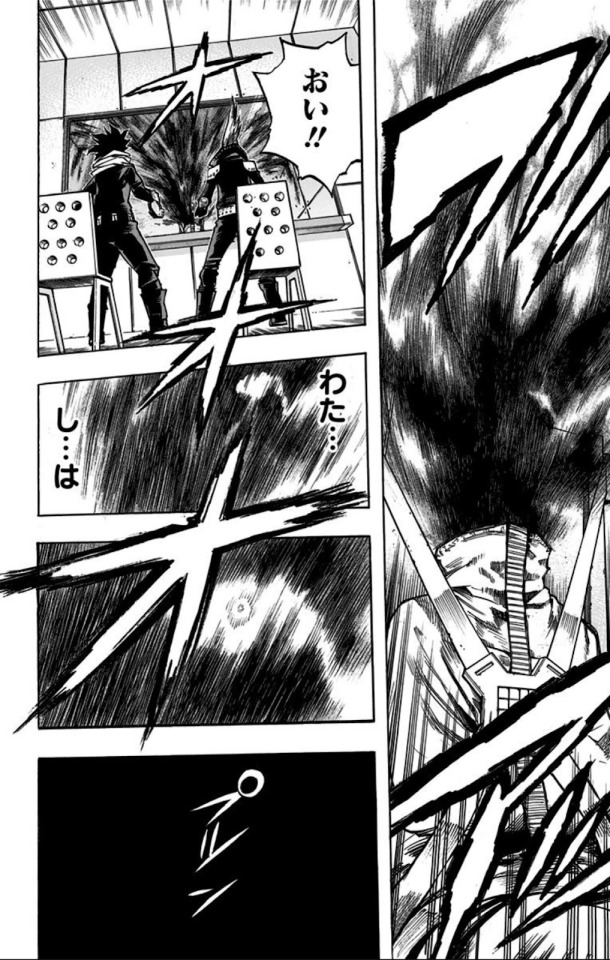
おい!!
= “Hey!!”
わた... し... は
= “I... am...”
In romaji, this says “wata... shi... wa.” Kurogiri uses “watashi” (私 or わたし) as his personal pronoun. Shirakumo uses “ore” (俺 or おれ). So, this would seem to be Kurogiri coming back “online,” BUT that’s Shirakumo’s eye, now on the left side, where Kurogiri’s blank eye had been.
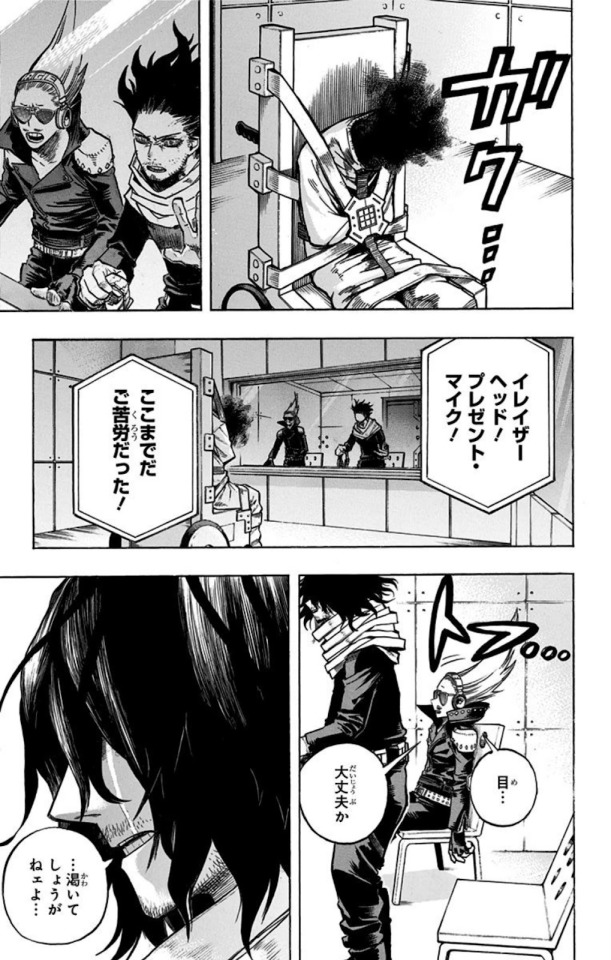
イレイザー ヘッド! プレゼント・ マイク!
= “Eraserhead! Present Mic!”
ここまでだご苦労だった!
= “Thank you for your hard work / trouble here!”
ご苦労 (romaji: gokurou) is a common Japanese expression meaning “thank you for your hard work” or “I appreciate your efforts.” Used as a noun, it means “trouble (I have put you through); (your) hard work.”
め... 大丈夫か
= “[Your] eyes... Are you okay?”
大丈夫 (or だいじょうぶ in hiragana, romaji: daijoubu) means “okay; all right; safe.” か marks this as a question.
Technically, a pronoun wasn’t given, so it’s not clear if Yamada is asking if Aizawa (“you”) is okay or if his eyes (“they”) are. The first words out of his mouth were “[your] eyes,” but Aizawa’s response makes me think Yamada was asking if he is okay because of the condition of his eyes.
... 渇いてしょうが ねぇよ...
= “... They dried out, but oh well / it can’t be helped...”
しょうが ねぇ (romaji: shouganai) is an expression that means “it can’t be helped; so be it; there’s no point (in doing something); there’s no reason (to do something); c’est la vie (French phrase borrowed by English speakers in the 1880s meaning “such is life” and used to say that situations of a particular kind, usually negative, inevitably happen in life and nothing can be done about them).”

病院が
= “[He said] hospital.”
もう少し具体的な話を探れそうでしたが
= “I was probing / hoping for him to say something a bit more definitive.”
お役に立てず申し訳ありません おやくにたてずもうしわけありません
= Kanji (meant): “I apologize for not fulfilling my duty / assignment / role.”
= Furigana (said): “I apologize for not being helpful / useful.”
とんでも ない!
= “Preposterous! What a thing to say!”
黒霧は...?
= “Kurogiri...?”
ショートでもしたかのように停止してる
= “[He] shut down again immediately after [saying ‘hospital’], like [he] short circuited.”
ともかく... かなりの進展だよ
= “In any case / be as that may / anyway... we’ve made considerable progress” or “In any case / be as that may / anyway... that was [a] significant development.”
先生もかつては生徒で... 夢を追いかけた
= “Teachers were also once students... and chased their dream(s).”
辛い話をさせたこの恩には必ず報いる
= “You will certainly be rewarded / repaid for the favor / debt of [confronting] this emotionally difficult situation.”
His “reward / repayment” was to lose an eye and a leg...
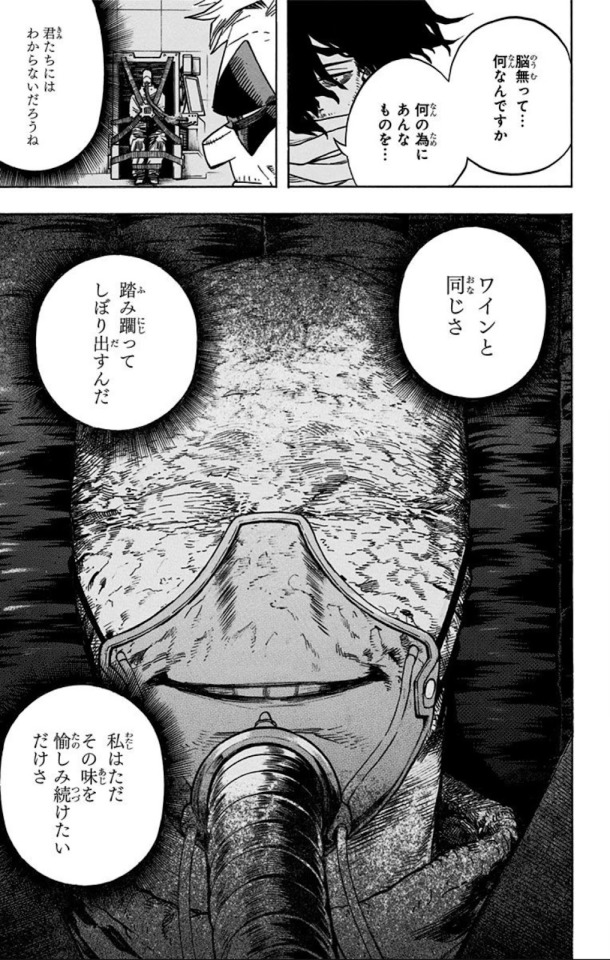
脳無って... 何なんですか
= “As for the Noumu... what exactly are they?”
何の為にあんなものを...
= “What purpose do they serve...?” or “For what reason were they made...?”
君たちにはわからないだろうね
= “You all don’t seem to understand.”
ワインと同じさ踏み躙ってしぼり出すんだ
= “It’s like [making] wine, crushing the grapes underfoot to extract their juice.
私はただその味を愉しみ続けたいだけさ
= “I only wanted to continue enjoying the taste.” Interestingly, AFO is using 私 (romaji: watashi) as his first person pronoun here, but he usually uses 僕 (romaji: boku). Watashi is more formal and polite than boku is, and boku is more formal and polite than 俺 (romaji: ore) is.
This is Gran Torino’s memory, so it might be that AFO appropriately switches to using a more respectful second person pronoun when he is speaking to someone “older” or of “higher status” than himself, although neither is actually true, as AFO is over one hundred years old and is the Big Bad of the BNHA universe while Gran Torino is less than one hundred years old and is, all things considered, just another Hero. Maybe he’s being cheeky. Maybe he thinks of himself as a young buck. Maybe he’s out of touch with reality and refuses to accept he’s grown up. Either way, he’s calling himself watashi.

わからない... ただ...
= “I don’t know / understand... but...”
これ以上犠牲者を増やすわけにはいかない
= “We can’t afford any more sacrifices / casualties / victims than this.”
The black dots to the right of 犠牲者 are called bouten, kenten, or wakiten. Think of them as emphasis dots. They mark important Japanese text and can serve several different purposes, which you can read about here: https://www.japanesewithanime.com/2018/03/furigana-dots-bouten.html?m=1#:~:text=References-,Definition,Marking%20shocking%20or%20surprising%20information.
犠 means “sacrifice” (as in ritual sacrifice), 牲 means “offering (like of an animal),” and 者 means “someone; person.” Together, these kanji form the word 犠牲者 and mean “victim / sacrifice (of a person).” Gran Torino is using it specifically to refer to Heroes (and maybe civilians) losing their lives to the conflict between AFO and OFA. He’s blind to the victimhood and humanity of criminals like Tomura and Kurogiri, whose only possible value stems from having a Hero course student as his base but even that is limited. He thinks of Kurogiri as a thing, not a person.
As of No.373, we know that Present Mic would rather Shirakumo die a second time and stay dead than be anything but the 17-year-old young man he remembers. A Shirakumo that cares for and wants to protect a criminal, even one he had a hand in raising, is not a Shirakumo Present Mic can accept or even considers worthy of breath. He is no friend of Present Mic’s and Present Mic is no friend of his. The thought that Shirakumo could become an inconvenience and impediment to Aizawa and Yamada’s own comfort and happiness and that their memories of Shirakumo could somehow be stolen by his becoming Kurogiri is enough for him to feel justified in killing another sentient being. He knows Kurogiri has the capacity for complex thought. He heard Kurogiri answer in the affirmative that he is anxious and worried about Tomura, so he knows he has feelings and motivations. He knows Kurogiri has all the markers for being *alive* and therefore able to be killed.
The series has reminded us on several occasions that Heroes are not officially authorized to kill, although neither Heroes nor civilians care if they do. Heroes are meant to save lives, not take them, but again and again we have been shown Heroes using excessive force to “stop” criminals with some, like Hawks, going as far as to break the professed rules and regulations of their profession to murder without personal or professional consequence (because the only people concerned that these self-appointed “guardians / defenders / Heroes” are not held to account for their crimes like any other lawbreaker would be are other “criminals / Villains”).
進展期待してます
= “I look forward to [more] progress.”
Look at how Aizawa is positioned. He is “looking forward,” like Shirakumo always did.
さて... 早く伝えなくては「病院」これだけではわからずとも...
= “Well... I should report this immediately, even if ‘hospital’ alone isn’t clear / understood...”

THE SHIFUKU
白雲 朧 (学年 17 )
Oboro Shirakumo (Age 17)
Birthday : 5/5
Height: 187cm (6”1)
好きなもの : 青空、太陽
Favorite Things : Blue Skies, Sun(light)
・THE・ ヴィジランテ
The Vigilante
イレイザーヘッド、プレゼント・マイクの
Eraserhead, Present Mic
学生時代の友人。
a friend from their student days.
本編では名前と後ろ姿が一回出てきただけですが、
In the main story, his (full) name and background only appeared once.
スピンオフの「ヴィジランテ」にて彼らの交流が描かれております。
Their interactions are depicted in the spin-off “Vigilante”.
スピンオフと本編の塩梅がすかなかなか難しかった・・・!!
It was quite difficult to balance the main story and the spin-off...!!

ラウドクラウド
Loud Cloud
THE・ラフデザイン
The Rough Design
本名 : 白雲 朧
Real Name: Oboro Shirakumo
Birthday: 5/5
Height: 187cm (6”1)
好きなもの: 青空、 太陽
Favorite Things: Blue Skies, Sun(light)
個性: 雲
Quirk: Cloud
堀越 ラフ(制服)
Horikoshi Rough (Uniform)
堀越 ラフ (ヒーロースーツ)
Horikoshi Rough (Hero Suit)
THE ・裏話
The Inside Story
白雲の設定は、 堀越先生の「相澤には学生時代にミリオの ようなポジションの親友がいて」という構想を起点に、 プロフィール、デザインなど、 堀越先生とヴィジランテ組 の間で何往復かやり取りをして形を整えて行きました。
Shirakumo’s creation was based on Horikoshi-sensei’s idea that ‘Aizawa had a close friend like / in a position similar to Mirio during his student days’. With that concept as the starting point, Horikoshi-sensei and the Vigilante team corresponded several times to finalize the profile, the design, and so on.
で、白雲の存在によって相澤やマイクの性格や立ち位置も 現在とは変わってくるので、その辺りの描写や 「現在に向 かう変化」の過程を描く必要から 「相澤少年編」は、ちょ い長めのエピソードに、もう何話か続きます。 [古橋】
Because of Shirakumo’s existence, the characters / personalities and positions / stances of Aizawa and Mike will change from what they are now. As it is necessary to portray that and the process of ‘transformation into the present’, the ‘Young Boy Aizawa Arc’ is a moderately long episode / vignette, [with] several more chapters to follow. [Furuhashi]
白雲の雄英制服時デザインは堀越さんによるもの。 ヒーロースーツのパイザーをなんとなく相澤先生のものと 似た形にしたのですが、 そのあたりを古橋さんに拾っても らえてありがたい限りです。 [別天]
Shirakumo’s UA uniform design was [drawn] by Horikoshi-san. I made the visor of his Hero suit somewhat similar to Aizawa-sensei’s, and I am endlessly grateful to Furuhashi-san for picking up on that. [Betten Court]
#bnha#mha#bnha manga#mha manga#bnha 253-255#mha 253-255#bnha manga translation#mha manga translation#bnha manga spoilers#mha manga spoilers#bnha aizawa#mha aizawa#bnha shirakumo#mha shirakumo#bnha present mic#mha present mic#oboro shirakumo#kurogiri is shirakumo
16 notes
·
View notes
Text

Is this Shigaraki?? Oh boy we’re fucked, this arc is going to be difficult and painful for all the heroes and students. I hope they all make it out ok
#bnha#mha#my hero academia#boku no hero academia#anime#manga#bnha spoilers#spoilers#bnha 255#chapter 255#bnha chapter 255#shigaraki#shigaraki tomura
473 notes
·
View notes









